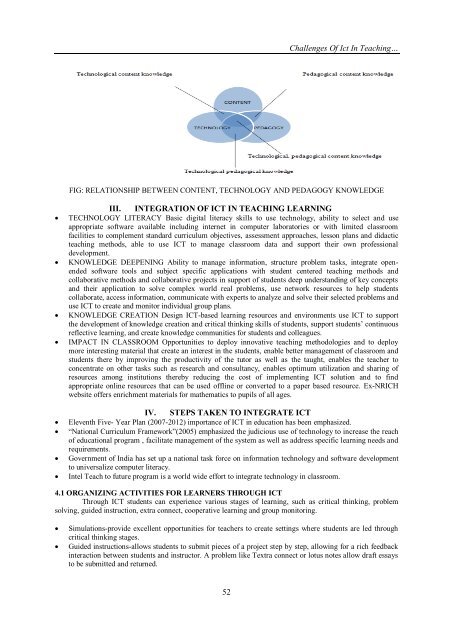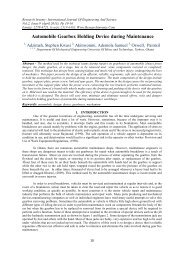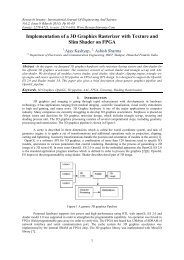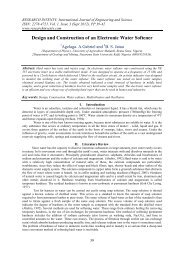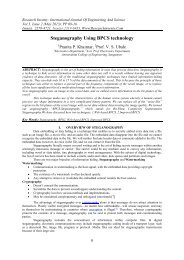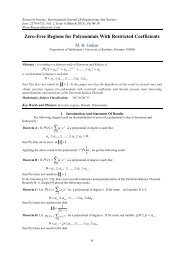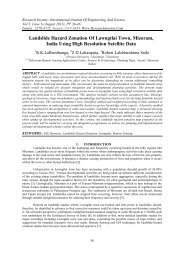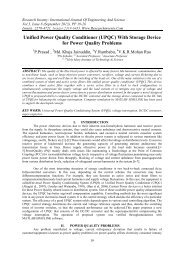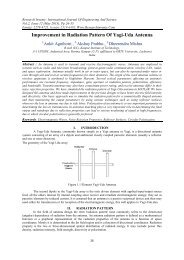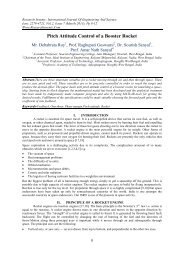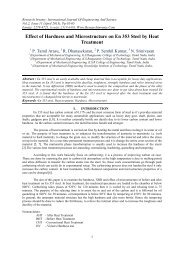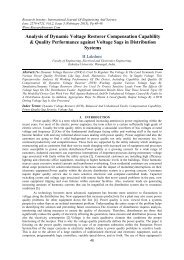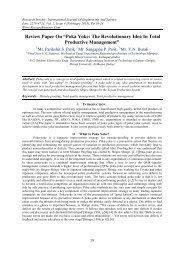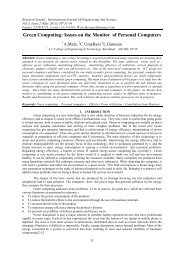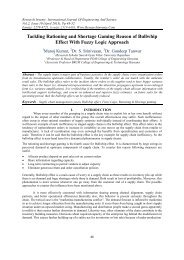Challenges of Ict in Teaching Learning Process - Research Inventy
Challenges of Ict in Teaching Learning Process - Research Inventy
Challenges of Ict in Teaching Learning Process - Research Inventy
You also want an ePaper? Increase the reach of your titles
YUMPU automatically turns print PDFs into web optimized ePapers that Google loves.
<strong>Challenges</strong> Of <strong>Ict</strong> In Teach<strong>in</strong>g…<br />
FIG: RELATIONSHIP BETWEEN CONTENT, TECHNOLOGY AND PEDAGOGY KNOWLEDGE<br />
<br />
<br />
<br />
<br />
<br />
<br />
<br />
<br />
III. INTEGRATION OF ICT IN TEACHING LEARNING<br />
TECHNOLOGY LITERACY Basic digital literacy skills to use technology, ability to select and use<br />
appropriate s<strong>of</strong>tware available <strong>in</strong>clud<strong>in</strong>g <strong>in</strong>ternet <strong>in</strong> computer laboratories or with limited classroom<br />
facilities to complement standard curriculum objectives, assessment approaches, lesson plans and didactic<br />
teach<strong>in</strong>g methods, able to use ICT to manage classroom data and support their own pr<strong>of</strong>essional<br />
development.<br />
KNOWLEDGE DEEPENING Ability to manage <strong>in</strong>formation, structure problem tasks, <strong>in</strong>tegrate openended<br />
s<strong>of</strong>tware tools and subject specific applications with student centered teach<strong>in</strong>g methods and<br />
collaborative methods and collaborative projects <strong>in</strong> support <strong>of</strong> students deep understand<strong>in</strong>g <strong>of</strong> key concepts<br />
and their application to solve complex world real problems, use network resources to help students<br />
collaborate, access <strong>in</strong>formation, communicate with experts to analyze and solve their selected problems and<br />
use ICT to create and monitor <strong>in</strong>dividual group plans.<br />
KNOWLEDGE CREATION Design ICT-based learn<strong>in</strong>g resources and environments use ICT to support<br />
the development <strong>of</strong> knowledge creation and critical th<strong>in</strong>k<strong>in</strong>g skills <strong>of</strong> students, support students’ cont<strong>in</strong>uous<br />
reflective learn<strong>in</strong>g, and create knowledge communities for students and colleagues.<br />
IMPACT IN CLASSROOM Opportunities to deploy <strong>in</strong>novative teach<strong>in</strong>g methodologies and to deploy<br />
more <strong>in</strong>terest<strong>in</strong>g material that create an <strong>in</strong>terest <strong>in</strong> the students, enable better management <strong>of</strong> classroom and<br />
students there by improv<strong>in</strong>g the productivity <strong>of</strong> the tutor as well as the taught, enables the teacher to<br />
concentrate on other tasks such as research and consultancy, enables optimum utilization and shar<strong>in</strong>g <strong>of</strong><br />
resources among <strong>in</strong>stitutions thereby reduc<strong>in</strong>g the cost <strong>of</strong> implement<strong>in</strong>g ICT solution and to f<strong>in</strong>d<br />
appropriate onl<strong>in</strong>e resources that can be used <strong>of</strong>fl<strong>in</strong>e or converted to a paper based resource. Ex-NRICH<br />
website <strong>of</strong>fers enrichment materials for mathematics to pupils <strong>of</strong> all ages.<br />
IV. STEPS TAKEN TO INTEGRATE ICT<br />
Eleventh Five- Year Plan (2007-2012) importance <strong>of</strong> ICT <strong>in</strong> education has been emphasized.<br />
“National Curriculum Framework”(2005) emphasized the judicious use <strong>of</strong> technology to <strong>in</strong>crease the reach<br />
<strong>of</strong> educational program , facilitate management <strong>of</strong> the system as well as address specific learn<strong>in</strong>g needs and<br />
requirements.<br />
Government <strong>of</strong> India has set up a national task force on <strong>in</strong>formation technology and s<strong>of</strong>tware development<br />
to universalize computer literacy.<br />
Intel Teach to future program is a world wide effort to <strong>in</strong>tegrate technology <strong>in</strong> classroom.<br />
4.1 ORGANIZING ACTIVITIES FOR LEARNERS THROUGH ICT<br />
Through ICT students can experience various stages <strong>of</strong> learn<strong>in</strong>g, such as critical th<strong>in</strong>k<strong>in</strong>g, problem<br />
solv<strong>in</strong>g, guided <strong>in</strong>struction, extra connect, cooperative learn<strong>in</strong>g and group monitor<strong>in</strong>g.<br />
<br />
<br />
Simulations-provide excellent opportunities for teachers to create sett<strong>in</strong>gs where students are led through<br />
critical th<strong>in</strong>k<strong>in</strong>g stages.<br />
Guided <strong>in</strong>structions-allows students to submit pieces <strong>of</strong> a project step by step, allow<strong>in</strong>g for a rich feedback<br />
<strong>in</strong>teraction between students and <strong>in</strong>structor. A problem like Textra connect or lotus notes allow draft essays<br />
to be submitted and returned.<br />
52


